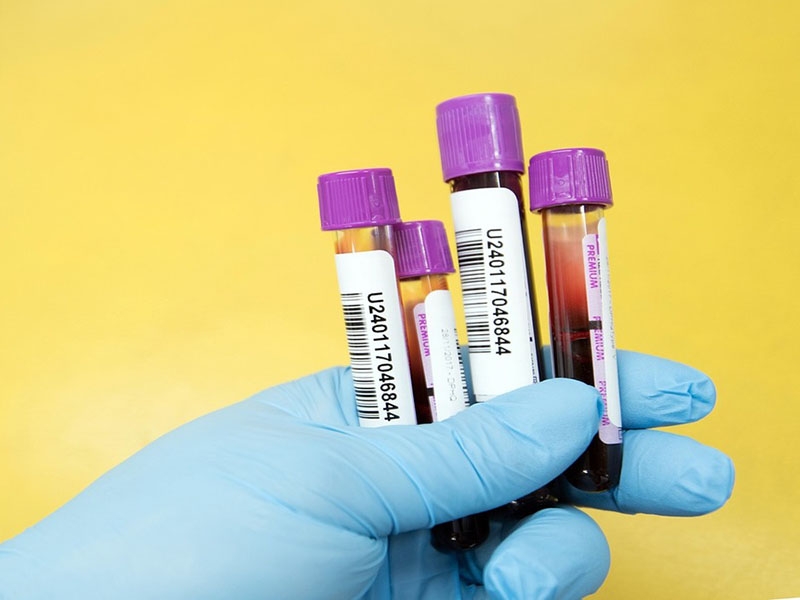
Blood test
A Blood Test is a common medical procedure used to analyze a sample of blood to assess various aspects of health, diagnose conditions, and monitor the effectiveness of treatments. Blood tests can reveal vital information about how your body is functioning by measuring levels of different components, such as red and white blood cells, platelets, glucose, electrolytes, and enzymes. Blood tests are often part of routine check-ups and are used to detect infections, evaluate organ function, and screen for diseases like diabetes and anemia.
During the procedure, a healthcare provider draws a small amount of blood from a vein, usually in the arm, using a syringe. The blood sample is then sent to a lab for analysis. Blood tests are quick, relatively painless, and provide critical data that helps guide your healthcare.
Types of Blood Tests
Complete blood count (CBC)
A Complete Blood Count (CBC) is one of the most commonly performed blood tests. It measures the number and types of cells in the blood, including red blood cells, white blood cells, hemoglobin, hematocrit, and platelets. This test helps detect a variety of conditions, such as anemia, infections, and blood disorders.
The CBC provides essential information about the body’s immune response and oxygen-carrying capacity. It can identify potential health issues early, allowing doctors to take preventive or corrective measures. For example, low red blood cells may suggest anemia, while elevated white blood cells might indicate an infection or inflammation. The test typically takes a few minutes, and results are available within a day or two.
Blood Glucose Test
A Blood Glucose Test is performed to measure the amount of glucose (sugar) in the blood. This test is especially important for diagnosing and monitoring diabetes. Blood glucose levels can indicate whether the body is effectively managing sugar, which is crucial for maintaining energy and metabolic function.
This test is usually done after fasting, allowing for accurate measurement of baseline glucose levels. If high glucose levels are detected, further testing may be recommended to confirm diabetes or assess how well a patient is managing their condition. The procedure is simple and typically requires only a small blood sample. Results are available within a few hours to a day.
Advantages of Blood Tests
Blood tests offer several key benefits:
- Quick and accurate: Blood tests provide fast results, often within 24 hours, allowing for prompt diagnosis and treatment.
- Comprehensive insights: These tests can measure a wide variety of health markers, making them an essential tool for preventive care, diagnosis, and monitoring of chronic conditions.
- Minimally invasive: The procedure is straightforward, involving only a small blood draw, which can be performed in a few minutes.
The procedure typically lasts around 10 minutes, with minimal discomfort, and patients can return to their daily activities immediately after.
Pre- and Post-exam Care
Pre-exam care: For certain types of blood tests, such as a glucose test, fasting may be required for several hours before the test. Your healthcare provider will provide specific instructions if fasting or other preparation is necessary. It’s important to follow these guidelines to ensure accurate results.
Post-exam care: After the blood draw, patients can resume normal activities right away. Occasionally, the site where the blood was drawn may be slightly tender or bruised, but this usually resolves within a day or two. Staying hydrated after the test can help with recovery and ensure the body replenishes any fluids lost.
Frequently Asked Questions (FAQ)
1. How long does a blood test take?
The blood draw itself takes only a few minutes, and most results are available within 24 to 48 hours.
2. Are blood tests painful?
Blood tests involve a small needle prick, which may cause minor discomfort, but most people find the procedure to be quick and relatively painless.
3. Can I eat before a blood test?
For some blood tests, such as a glucose test, fasting is required. Your healthcare provider will inform you if you need to avoid food or drink before the test.
Blood Test Services at Clinic Consultation
At Clinic Consultation, we offer a full range of blood test services to help diagnose, monitor, and prevent various health conditions. Whether you need routine testing, a specific diagnostic test, or ongoing monitoring for a chronic condition, our expert team provides reliable, accurate results in a professional and comfortable environment.
Book an appointment today to schedule your blood test at Clinic Consultation and take a proactive step towards managing your health.
Click the button below to schedule your appointment online.